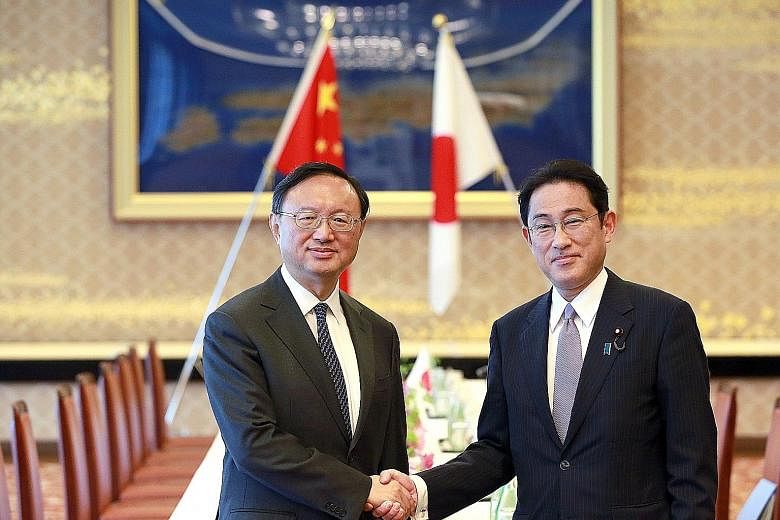The North Korean missile and nuclear programme should be disarmed by peaceful means, Chinese State Councillor Yang Jiechi said at a meeting with Japanese Foreign Minister Fumio Kishida yesterday.
Even so, Mr Kishida urged China, which is the North's major economic benefactor, to amp up the pressure on the reclusive state so as to sever its monetary lifeline.
Separately, Japanese Prime Minister Shinzo Abe spoke to South Korean President Moon Jae In in a phone call and the two leaders agree to promote security ties alongside their common ally, the US.
Mr Abe reiterated his longstanding position that "dialogue for the sake of dialogue is pointless", and that the continued provocations mean it was necessary to tighten the noose on Pyongyang further.
North Korea has conducted nine tests involving 12 missiles this year. Monday's ballistic missile launch - the third in three weeks - is suspected to be a Scud variant that fell into waters in Japan's exclusive economic zone, breaching the zone for the fourth time so far.
Pyongyang yesterday touted the success of Monday's launch, saying it was a new type of precision- guided ballistic missile, and that it was closer to its goal of sending a "bigger gift package to the Yankees", the implication being its desire for an intercontinental missile that can strike the United States.
Defence Minister Tomomi Inada said image analyses indicate a rocket with a warhead and wings that can be controlled had been fired from a mobile launch vehicle, and it was urgent for Japan to boost its missile defence capabilities.
Chief Cabinet Secretary Yoshihide Suga also told a news conference that Tokyo believes the North has achieved a "certain level of technological progress". These advancements were cited by Mr Kishida at his meeting with Mr Yang, as he said China and Japan should work even more closely together as neighbours to deal with the threat.
The theme of collaboration between the two erstwhile foes which have long been sceptical of each other was prevalent during Mr Yang's talks with Mr Kishida, and with National Security Adviser Shotaro Yachi on Monday.
At both meetings, it was noted that Sino-Japanese ties are at a pivotal juncture 45 years after both countries normalised ties.
Mr Yang, whose post has been compared to that of a deputy prime minister, stressed that the two countries need to build political trust and said China should be seen as a partner instead of a threat.
Ties between the world's second and third largest economies have repeatedly been strained over historical baggage. The two sides are also mired in a territorial dispute over a group of islets in the East China Sea known as the Senkakus in Japan and Diaoyus in China.
Meanwhile, China, which claims almost the entire South China Sea, has been building up military assets in the waterway. While Japan is not a claimant, it has been a vocal champion of the maritime rule of law and international norms.
Beijing was incensed by a communique issued by leaders of the Group of Seven countries, including Japan, on Saturday. It pointedly said: "We remain concerned about the situation in the East and South China Seas and strongly opposed to any unilateral actions that could increase tensions. We urge all parties to pursue demilitarisation of disputed features."
Mr Yang on Monday asked Japan to be "cautious with its words and actions" regarding the South China Sea and to instead "play a constructive role" in resolving the issues.

